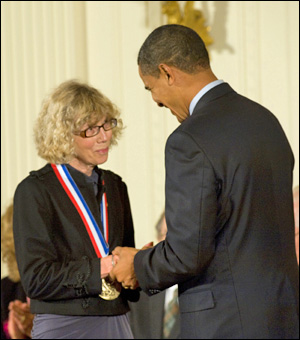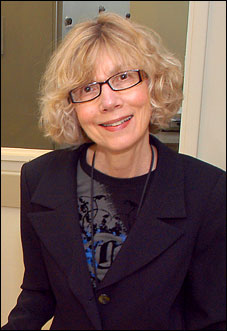Brookhaven Lab's Joanna Fowler Awarded National Medal of Science
September 24, 2009
 enlarge
enlarge
President Barack Obama awards Brookhaven's Joanna Fowler the National Medal of Science at A White House East Room ceremony, October 7, 2009. Photo by Ryan K Morris.
UPTON, NY — Joanna Fowler, a senior chemist and Director of the Radiotracer Chemistry, Instrumentation and Biological Imaging Program at the U.S. Department of Energy’s Brookhaven National Laboratory, was awarded the National Medal of Science at a White House ceremony on October 7. She is one of nine researchers named by President Barack Obama to receive the nation’s highest award for lifetime achievement in science.
The National Medal of Science was created by statute in 1959 and is administered for the White House by the National Science Foundation. The annual award recognizes individuals who have made outstanding contributions to science and engineering. Nominees are selected by a committee of Presidential appointees based on their advanced knowledge in, and contributions to, the biological, behavioral/social, and physical sciences, as well as chemistry, engineering, computing and mathematics.
“This award is both humbling and gratifying,” Fowler said. “It recognizes the importance of chemistry and imaging in advancing our knowledge of the human brain, particularly as it is affected by drugs, disease and aging.”
Fowler has been a major contributor to brain research and the study of diseases such as addiction, which she has studied using an imaging technique called positron emission tomography (PET). In 1976, Fowler and her colleagues synthesized 18F-fluorodeoxyglucose (FDG), a radiotracer used in PET. Today, FDG is widely used in hospitals and research centers throughout the world to diagnose and study neurological and psychiatric diseases and to diagnose cancer.
|
|
In her recent research, Fowler has focused on changes in the brain circuits that are disrupted during drug addiction. Some of her studies included imaging the uptake and movement of cocaine and methamphetamine in the human brain, which shed light on why these drugs are so powerfully addictive. She is also involved in PET studies to understand the action of therapeutic drugs and facilitate the introduction of new drugs into the practice of medicine.
Another research area is centered on variations in monoamine oxidase (MAO) genes and how they affect personality and vulnerability to psychiatric disorders. In earlier research, Fowler discovered that cigarette smokers have reduced levels of MAO, an enzyme that breaks down dopamine, the neurotransmitter that mediates reward, motivation and movement. This finding may account for the high rate of smoking in individuals who are depressed or addicted to drugs.
After earning a B.A. in chemistry at the University of South Florida in 1964 and a Ph.D. in chemistry at the University of Colorado in 1967, Fowler carried out postdoctoral research at the University of East Anglia, in Norwich, England, and at Brookhaven Lab. Joining the Laboratory in 1969, Fowler has spent her entire career at Brookhaven.
Fowler’s honors include the Society of Nuclear Medicine’s Paul Aebersold Award and the Department of Energy’s E. O. Lawrence Award, both received in 1997; the American Chemical Society’s Francis P. Garvin-John M. Olin Medal in 1998; and the Glen T. Seaborg Award in 2002. She was elected to the National Academy of Sciences in 2004, and, earlier this year, she was honored with the National Academy of Sciences Award in Chemical Sciences and was inducted into the Long Island Technology Hall of Fame. Fowler has published about 350 peer-reviewed articles and holds eight patents for radiolabeling procedures.
Three other Brookhaven Lab researchers have been honored with the National Medal of Science: Donald D. Van Slyke (Biological Sciences, 1965), Maurice Goldhaber (Physical Sciences, 1983), and Raymond Davis (Physical Sciences, 2001).
Fowler’s research is funded by the U.S. Department of Energy’s Office of Science, which provides infrastructure support for technology development, and the National Institutes of Health.
2009-11010 | INT/EXT | Newsroom










